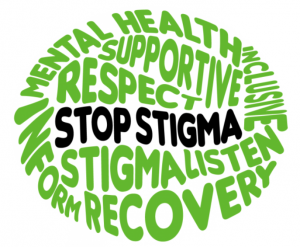Dispelling the Myths: How to talk about mental health and what you can do to cure stigma
Patricia Coffey, MSW, LICSW, is the Mental Health Education Program Manager for the Kids Healthy Minds Initiative at Franciscan Children’s. The Kids Healthy Minds Initiative is a robust mental health awareness and community education program founded in partnership with the Archdiocese of Boston. To learn more about the Kids Healthy Minds Initiative or to schedule an education program for your parish, please contact KidsHealthyMinds@FranciscanChildrens.org.

The stigma commonly associated with mental illness affects us all. Whether you are experiencing it yourself or seeing the disparaging effects on a loved one, colleague or neighbor, stigma can cause isolation, fear and hopelessness. It can lead individuals to hide their mental health symptoms, fail to seek professional help or detach themselves from their community. The shame associated with stigma attacks a person’s sense of self, pride and can diminish their potential.
Many of us are unaware that we can be daily reinforcers of stigma. Whether it was that time you told someone to “cheer up,” “snap out of it,” or “be more positive” when you were unaware they were struggling with depression. Or the time that you avoided a neighbor because you didn’t know how to ask them how their son, who left school due to schizophrenia, was doing. Or the time you crossed the street to avoid having a conversation with a friend whose daughter had recently died by suicide. Having a better understanding of mental illness may have given you the ability to reach out to each of these people in an emphatic and informed manner.
Research has proven that connectedness is a main protective factor that contributes to good mental health. Families caring for a child with mental illness can feel unwelcomed and ostracized from their community, sometimes even by their own extended families. Mental illness is sometimes called the “no casserole” disease. This anecdote brings us to the heart of our society’s reaction to mental illness. It is very likely that after a family receives a mental illness diagnosis they are not being showered with casseroles and sentiments from their family, colleagues and neighbors. If we can begin to treat people who live with mental illness with the same support and empathy we give those who live with cancer or diabetes, we will make significant strides in creating a stigma-free community.
Learning the facts about mental illness and how to begin a dialogue on these sensitive issues is the best place to start to reduce the stigma around mental illness. It is only through deliberate and mindful actions that we can make a change.
So, let’s talk about the facts and what we can do now.
What are the facts?
Fact: Mental illness is prevalent. 1 in 5 U.S youth have a mental health diagnosis. 50% of all cases of mental illness begin by age 14 and 75% by age 24.
Fact: Mental illness is a real disease. Just like heart disease and diabetes, mental illness is a legitimate illness.
Fact: You can treat mental illness. Innovations in medicine and therapy make recovery a reality for people living with mental illness.
Fact: A mental illness does not make a person more likely to be violent or dangerous. People living with mental illness are actually more likely to be victims of violence; they are victimized 4x more than the general public
What can we do?
Use respectful, person-first language.
- “She is living with bipolar disorder” not “she is bipolar”
- “He has depression” not “He is depressed”
- “They died by suicide” not “they committed suicide”
Eliminate our use of slang and labeling.
- Avoid saying “schizo, psycho, demented, crazy, lunatic, nuts”
See the person not the condition.
- A mental illness does not make someone any less of a person, they just have different experiences that not everyone has to face
Connect with others.
- Offer support to people with a mental illness, caretakers and families
- Be an active listener and let people tell their story
- Show empathy, even if you don’t fully understand the person’s experience
- Talk openly about stigma and challenge misconceptions when you hear them
- Share knowledge and facts about mental illness with other
In our parishes
- Encourage homilies on mental health
- Pray openly for people who are living with a mental illness
- Offer to take a meal to a family as we do for those with a medical illness
- Have professional resources readily available for parishoners to access
- Host education sessions and workshops on mental health
For more information and mental health resources, please visit Franciscan Children’s Mental Health Resources web page.
View All Blog Stories